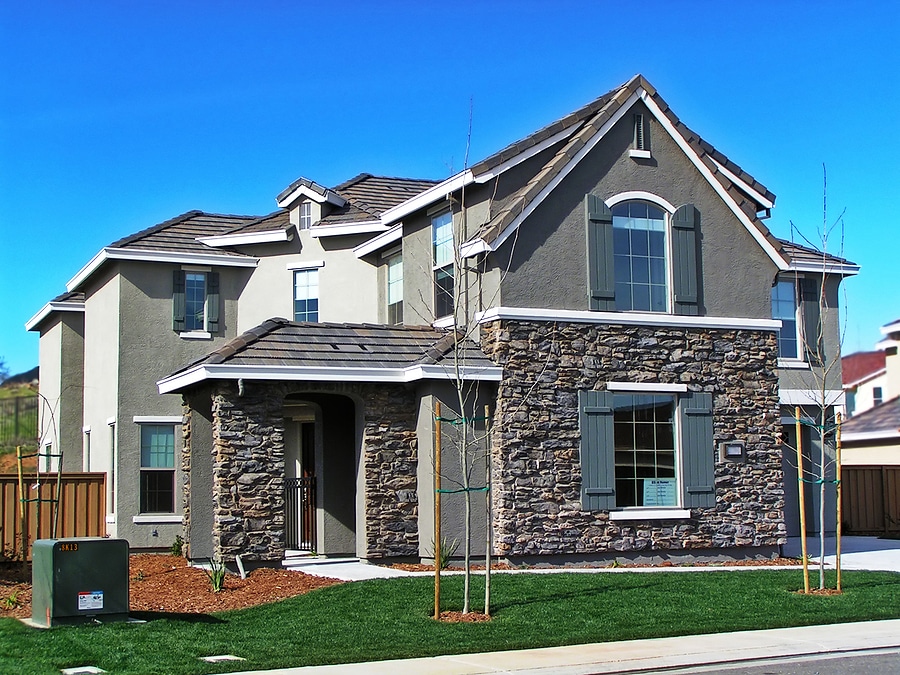Answers to Frequently Asked Questions about Stucco
Although the elements that blend to create plaster and stucco are pretty straightforward, the material is not. In reality, it takes a skilled craftsman to mix and apply stucco so that it lasts for years to come. Done well, stucco provides the best insulation and longevity compared to other residential building materials. At Worldgate Plaster & Stucco Company, we field questions from people about stucco all the time. For that reason, we compiled a list of frequently asked questions about stucco.

What’s the Difference between Stucco, Plaster, and EIFS?
Plaster is the general term for a material applied to an interior wall surface in a thin layer. Moreover, people often use the word “plastering” to describe the act of applying various materials to a wall surface. We call the mixture of cement, lime, sand, and water “stucco.” Finally, some refer to exterior insulation and finish systems (EIFS) as “synthetic” stucco, but that would be an incorrect label. EIFS adds a unique layer under the stucco that acts as an insulated barrier against moisture. Adhesive or fasteners connect the barrier to the insulation board, which creates a drainage plane for water. The installer then applies stucco over the top of the mesh.
Can You Apply Stucco over Brick?
Yes, you can apply stucco over brick. Done right, it’s a cost-effective option that revitalizes the exterior finish and improves water resistance insulation. However, painted brick involves extra steps. For instance, you should scrape, use water pressure, or sandblast the brick to remove the paint. You may also want to consider a bonding agent. It should take two to three coats to do the trick.
Does Stucco Require Curing?
Any cement-based materials, such as concrete driveways and stucco, require time to cure. The curing process allows the newly- poured or applied mixture to be set after maintaining an appropriate temperature for a set amount of time. The process produces hydration and ensures a solid bond.
How Long Does Stucco Last?
Worldgate is often asked questions about stucco, and this one is common. The answer partially depends on how well the stucco was mixed and applied. This is where hiring the right person is crucial to the longevity of the home exterior. Worldgate is often called to repair problems from previous contractors. Done well, stucco can easily last 50-100 years or longer.
Can You Apply Stucco in Cold Weather?
You shouldn’t apply stucco in temperatures lower than 40 degrees. Anything lower than that causes bonding to become problematic. However, it’s possible to heat the mixture and the water that’s applied. On the other hand, a professional installer knows not to heat the materials too hot. After installation, the temperature should remain above freezing for a solid 48 hours.
Does Stucco Come in the Color I Want?
One of the remarkable things about stucco is the wide variety of colors and finishes homeowners have. You can paint stucco, but you can also add tint to the mixture itself or buy it pre-mixed. When painting over the top of plaster, ensure the paint is cement-based.
How Do You Maintain Stucco?
It’s a good idea to get a stucco inspection every so often to ensure everything is structurally sound, and that there is no moisture intrusion. It’s also a good idea to wash down the house every year or so, and take a look around the exterior to note any cracks or staining. Maintenance is often the key to longevity.
We hope you’ve found our answers to frequently asked questions about stucco helpful. If you’d like to learn more about stucco and EIFS systems, call Worldgate at (703) 283-6886, or request an estimate online. We proudly serve Northern Virginia, including Virginia Beach, Fairfax County, Arlington County, and more.

